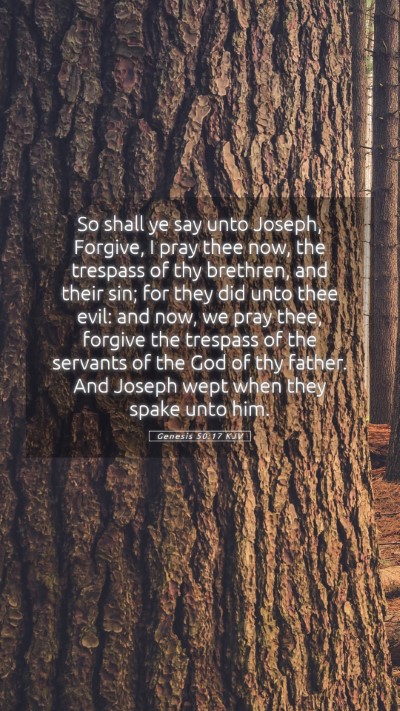Understanding Genesis 50:17
Bible Verse: Genesis 50:17 - "So they sent a message to Joseph, saying, 'Your father gave us instructions before he died, saying, "Say to Joseph, please forgive the transgression of your brothers and their sin, because they did evil to you." And now, please forgive the transgression of the servants of the God of your father.' And Joseph wept when they spoke to him."
Overview and Context
This passage comes at the conclusion of the Book of Genesis, where Joseph’s brothers are concerned about their past actions against him. They fear that Joseph, now a powerful leader in Egypt, may seek vengeance after their father Jacob’s death. The verse captures a moment of vulnerability and emotion for Joseph, underscoring themes of forgiveness and reconciliation.
Key Themes
- Forgiveness: Joseph’s response to his brothers’ plea reveals the deep emotional impact of forgiveness, which is central to this narrative.
- Family Dynamics: The complexity of familial relationships is highlighted, showing both past grievances and the desire for healing.
- Divine Providence: Underlying this verse is the belief that God orchestrates events, even those that seem tragic, for a greater purpose.
Commentary Insights
The insights from various public domain commentaries provide a deeper understanding of Genesis 50:17:
- Matthew Henry: Henry emphasizes the gravity of the request for forgiveness made by the brothers and the sincerity of Joseph's emotional response. He notes that Joseph's tears signify both a relief from tension and a compassionate heart that is willing to reconcile, reflecting Christ-like forgiveness. Henry points out that the brothers recognized their wrong and sought restoration, which is essential in any Christian community.
- Albert Barnes: Barnes comments on the tactic used by the brothers to convey their father's message. He suggests that their approach indicates their deep fear of Joseph's reprisals and the fragile state of their relationships. The act of invoking their father's name signifies respect and a hope for reunion without jealousy or bitterness. Barnes also highlights the significance of reconciliation in familial love and God’s overarching plan.
- Adam Clarke: Clarke amplifies the emotional context of the passage, remarking on the poignant nature of Joseph's weeping. He clarifies that Joseph’s tears are not only for his brothers' current feelings but also for the pain inflicted due to their earlier actions. Clarke underscores that true forgiveness involves acknowledgment of wrongdoing, which Joseph ultimately provides, reflecting the character of God in the process.
Application and Significance
Genesis 50:17 provides crucial Bible verse explanations relevant for today’s readers:
- Understanding Reconciliation: The necessity of honesty and humility in seeking forgiveness resonates across generations. Individuals can reflect on their own lives to mend relationships with those they may have hurt or who have hurt them.
- Emotional Release: Joseph's weeping teaches that expressing emotion is a vital step toward healing. It serves as a reminder of the importance of processing grief and pain to move toward reconciliation.
- God’s Sovereignty: Through this narrative, readers are encouraged to recognize that God can use even the worst acts for His glory, a theme that is consistent in both the Old and New Testaments.
Cross References
This verse connects to several other Bible passages emphasizing forgiveness and reconciliation:
- Matthew 6:14-15: Jesus teaches the importance of forgiveness in order to be forgiven.
- Ephesians 4:32: "Be kind to one another, tenderhearted, forgiving one another, as God in Christ forgave you."
- Genesis 45:5: Joseph earlier reassures his brothers of God's providence and his forgiveness.
Conclusion
In summary, Genesis 50:17 is rich in Bible verse meanings and provides multiple layers for Bible study insights. The themes of forgiveness, familial love, and divine orchestration resonate deeply within this narrative. As you engage with this verse, consider the implications it has for your personal relationships and your understanding of God’s grace in action.


